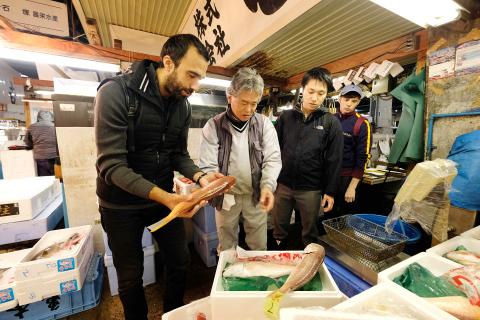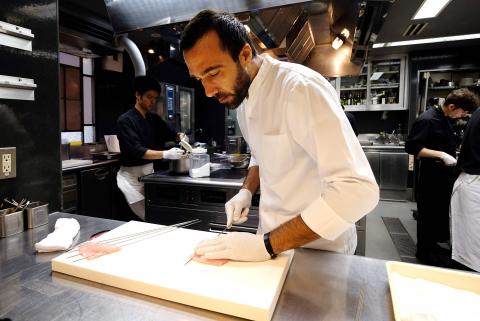When two-starred Michelin chef Lionel Beccat reminisces about Tsukiji, the world’s biggest fish market in Tokyo, it is not the ocean’s bounty that stirs memories but the fishmongers themselves.
“The story of Tsukiji is quite simply a story about human relationships,” Beccay says as he browses through the market at the crack of dawn in search of prawns and fish for his lunchtime service.
Beccat, 42, is executive chef at Esquisse, a restaurant in the Japanese capital’s ultra-chic Ginza district, and he has been making the short journey to the market for the past 12 years.

Photo: AFP
But all that will come to an end on today when Tsukiji closes after 83 years, moving to a purpose-built site at Toyosu, several kilometers east.
Now a veteran of the market, he says it took several years to establish a trusted relationship with the merchants of Tsukiji.
“I quickly had to get used to the idea that I knew nothing about fish,” Beccat said, even though he comes from the French fishing port of Marseille.

Photo: AFP
At Tsukiji, “it is the fishmongers who choose their clients. Not the other way around,” he said, adding that even the top chefs show deference to the vendors and their knowledge.
The market itself, a rabbit warren and tourist magnet of tiny shops selling every conceivable type of produce from the sea, cannot fail to inspire a professional chef, Beccat said. “Tsukiji is a world unto itself.”
He finds inspiration in “the range of produce one finds there, the expertise and advice from the fishmongers” and even “the smell, the movements, the light.”
“Coming here, day after day, week after week, month after month, gradually changes the way you cook, even without you noticing it.”
One of Beccat’s suppliers, Masatake Ayabe, has enjoyed a 30-year career in Tsukiji and fears that business might suffer when the market moves to Toyosu.
“There is no other market in the world which brings together so much fish, and people do us the honor of coming to shop here,” said Ayabe.
“But I am sure we will have fewer customers at Toyosu.”
He said he was sad to leave Tsukiji and “was not really looking forward to going to Toyosu.”
“It is further away for customers, we wonder how we will have such good relationships with them. There are also quite a few question marks over deliveries, access,” said Ayabe, who runs the Kamemoto Shoten fishmongers.
Tsukiji critics say the 83-year-old market is no longer fit for the modern world, pointing to questionable hygiene standards in the narrow streets and insufficient protection against fire.
Tokyo mayor Yuriko Koike, who has championed the move, says the new market, on the site of a former gas plant, will use cutting-edge technology to provide a modern environment for selling fish.
Beccat himself acknowledges that “it will be better from a sanitary point of view” and the fishmongers will suffer less from extremes of cold and heat, but he too points to a difference in atmosphere.
“Tsukiji is addictive: if you do not go in the morning, the day is not quite the same,” he said.
“It is the place that has taught me most in my life. A page of my professional life is turning.”

The canonical shot of an East Asian city is a night skyline studded with towering apartment and office buildings, bright with neon and plastic signage, a landscape of energy and modernity. Another classic image is the same city seen from above, in which identical apartment towers march across the city, spilling out over nearby geography, like stylized soldiers colonizing new territory in a board game. Densely populated dynamic conurbations of money, technological innovation and convenience, it is hard to see the cities of East Asia as what they truly are: necropolises. Why is this? The East Asian development model, with

June 16 to June 22 The following flyer appeared on the streets of Hsinchu on June 12, 1895: “Taipei has already fallen to the Japanese barbarians, who have brought great misery to our land and people. We heard that the Japanese occupiers will tax our gardens, our houses, our bodies, and even our chickens, dogs, cows and pigs. They wear their hair wild, carve their teeth, tattoo their foreheads, wear strange clothes and speak a strange language. How can we be ruled by such people?” Posted by civilian militia leader Wu Tang-hsing (吳湯興), it was a call to arms to retake

This is a deeply unsettling period in Taiwan. Uncertainties are everywhere while everyone waits for a small army of other shoes to drop on nearly every front. During challenging times, interesting political changes can happen, yet all three major political parties are beset with scandals, strife and self-inflicted wounds. As the ruling party, the Democratic Progressive Party (DPP) is held accountable for not only the challenges to the party, but also the nation. Taiwan is geopolitically and economically under threat. Domestically, the administration is under siege by the opposition-controlled legislature and growing discontent with what opponents characterize as arrogant, autocratic

When Lisa, 20, laces into her ultra-high heels for her shift at a strip club in Ukraine’s Kharkiv, she knows that aside from dancing, she will have to comfort traumatized soldiers. Since Russia’s 2022 invasion, exhausted troops are the main clientele of the Flash Dancers club in the center of the northeastern city, just 20 kilometers from Russian forces. For some customers, it provides an “escape” from the war, said Valerya Zavatska — a 25-year-old law graduate who runs the club with her mother, an ex-dancer. But many are not there just for the show. They “want to talk about what hurts,” she